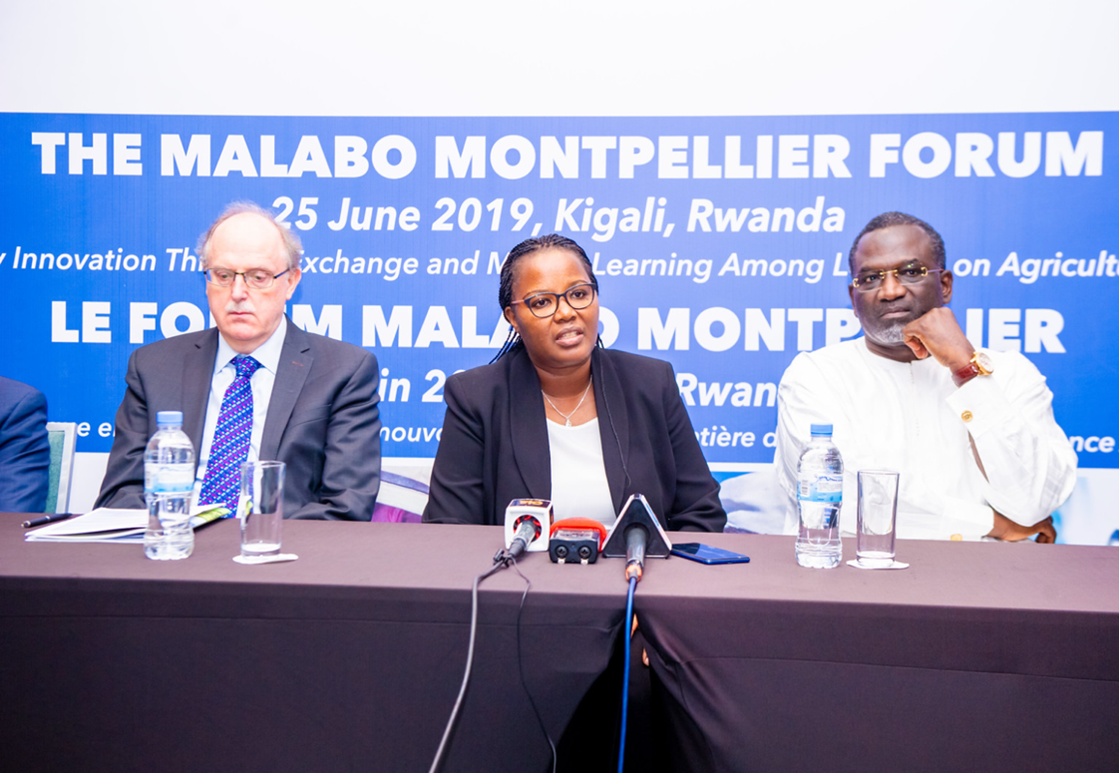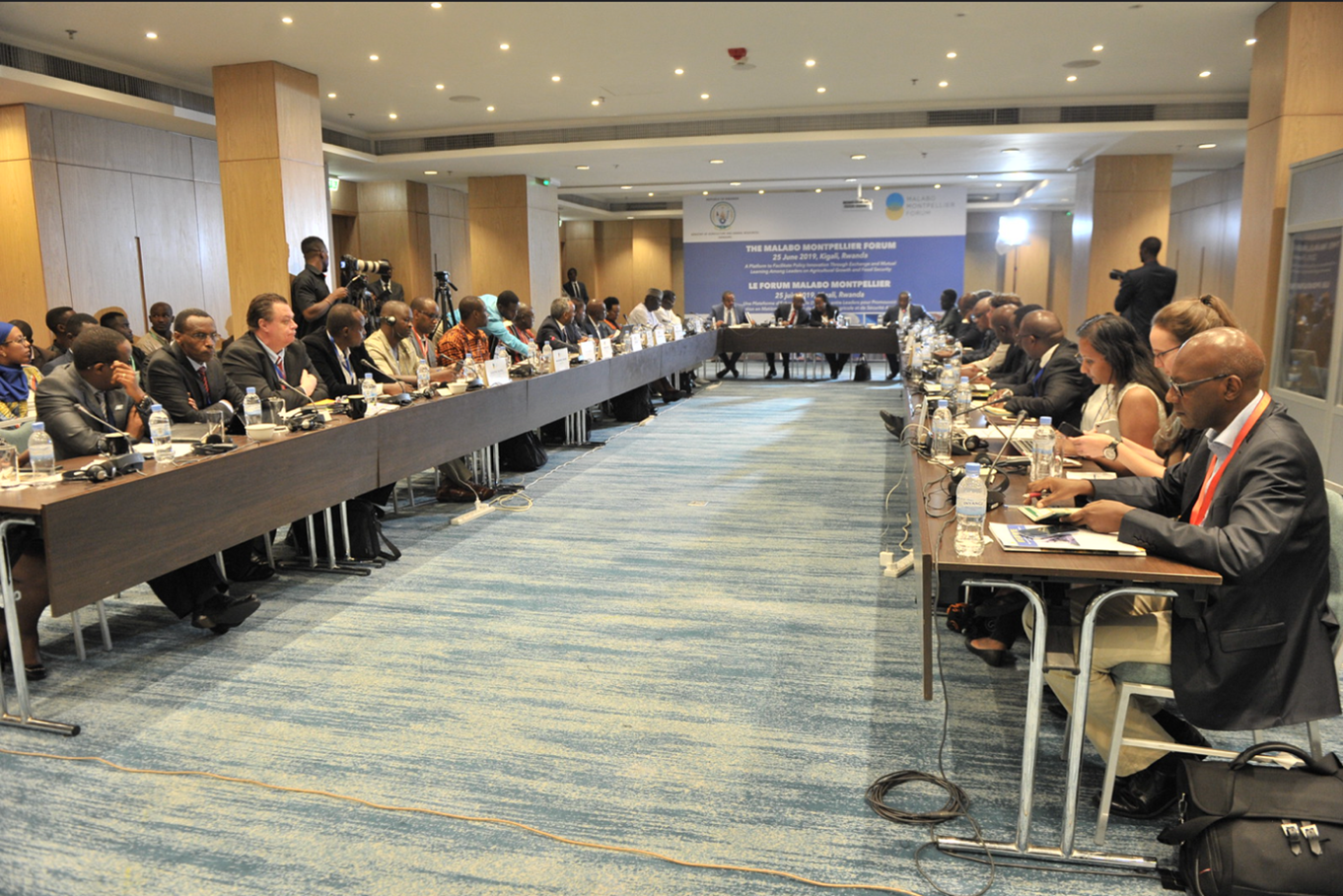Knowledge Supply linked to Knowledge Demand equals better Policy Design and Implementation: Unpacking AKADEMIYA2063's Five-Year Strategy for Transforming African Economies
By Layih Butake
07/10/2021 Malabo Montpellier Forum, 2019.
Malabo Montpellier Forum, 2019.
From left to right: MaMo Panel Co-chair Joachim von Braun, Former Hon. Minister of Agriculture (Rwanda), Gerardine Mukeshimana, and MaMo Panel Co-chair & AKADEMIYA2063 Executive Chairperson, Ousmane Badiane.
The need to rethink policy and craft intelligent systems for the expansion of Africa’s economic recovery gains is even more urgent against the backdrop of global development challenges such as growing populations and rising urbanization, shifting demographics, increasing inequalities, and the “new normal” ushered in by the COVID-19 pandemic. Even though Africa fared remarkably better than experts predicted, the devastating effects of the pandemic on the continent’s economy have been conspicuous. And while agriculture remains a viable path for the continent’s emergence, smallholder farmers have faced significant hurdles.
According to experts, weaknesses in the agriculture sector and macroeconomic policies shaped the performance of African economies through the period of decline. Nevertheless, improvements in policies and investment decisions made possible the longest sustained period of economic growth in the continent (Badiane and Makombe, 2015; Conway, Badiane and Glatzel, 2019). This evidence further underscores the need for solid systems operated by a pipeline of skilled actors to leverage “the expertise we need” for “the Africa we want”. Africa’s economic prosperity depends on the active participation of knowledge-based institutions in fashioning innovative and predictive economic models and evidence-based systems to inform public policy towards the transformation of African economies. This is the strategic setting of AKADEMIYA2063’s five-year blueprint.
A Knowledge-driven Theory of Change
“Through this strategy, we set out to link knowledge supply to knowledge demand at national, regional and continental levels to equip implementing actors with the knowledge and guidance to calibrate, target, and achieve the best outcomes with the lowest level of resources. This will lead to better policies and better development outputs,” said Dr. Ousmane Badiane, Executive Chairperson at AKADEMIYA2063.
This Theory of Change will intervene on three levels, namely Carrier Policy Processes (defined agendas, programs or initiatives), Anchor Organizations (lead implementing organizations), and Operational Actors (key experts within the organizations). While the Knowledge Supply component will align research with policy agendas, build strategic partnerships and provide data-centred support, Knowledge Demand will define strategy and policy agendas, coordinate stakeholder actions, and engage (at minimum technical capacity) with researchers.
AKADEMIYA2063’s approach will be anchored on capacity building, proximity, relevance, and mutual accountability: "We don't do science for science’s sake. We will look at the questions being asked here and develop the capacities, tools and methodologies to address them. We must embed our data and analytical products into the planning and implementation process to facilitate progress review, benchmarking, and tracking, such as to breed the level of accountability that would enable better policy outcomes," said Dr. Badiane.
Leveraging a Robust Operational Capacity
AKADEMIYA2063 is an Africa-based non-profit research organization with headquarters in Kigali, Rwanda and a regional office in Dakar, Senegal. Inspired by the ambitions of Agenda 2063 and grounded in the recognition of the central importance of strong knowledge and evidence systems, the vision of AKADEMIYA2063 is an Africa with the expertise we need for the Africa we want. This expertise must be responsive to the continent’s needs for data and analysis to ensure high-quality policy design and execution. Inclusive, evidence-informed policymaking is key to meeting the continent’s development aspirations, creating wealth and changing livelihoods for the better. The 2021-2025 Strategy will be brought to fruition by AKADEMIYA2063’s eight Departments, spanning Capacity and Employment, Knowledge Systems, Policy Innovation, Operational Support, Data Management, Digital Products and Technology, External Relations, Communication and Outreach, and Finance and Administration. These experts will design and rely on smart systems and lessons learned to drive the implementation of the Strategy.
Stakeholder Perspectives
 Malabo Montpellier Forum, 2019.
Malabo Montpellier Forum, 2019.
The Five-Year Strategy elicited overwhelmingly positive reactions from the over 70 stakeholders (with registrants from 27 countries and 65 institutions) who zoomed into the October 6, 2021 Board Seminar to launch the plan.
“AKADEMIYA2063 has shown how its Five-Year Strategy will help advance their mission to provide data, policy analysis, and the capacity to help the members of the African Union in achieving economic transformation and shared prosperity”, Dr. Gerardine Mukeshimana, Rwanda's Minister of Agriculture and Animal Resources. “Rwanda has signed a Memorandum of Understanding with AKADEMIYA2063, and we have agreed that this Five-Year Strategy will support our national strategies and policies, such as the Rwanda Strategy for Agricultural Transformation and other sub-strategies. We hope to benefit from the expertise of AKADEMIYA2063 for accurate and timely data for decision-making,” she said.
Layih Butake is the Director of Communication and Outreach at AKADEMIYA2063.
